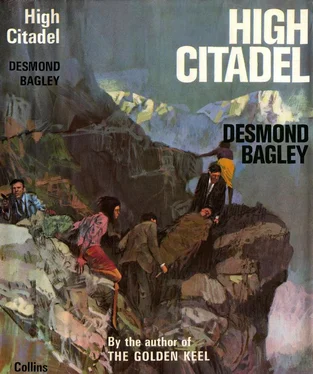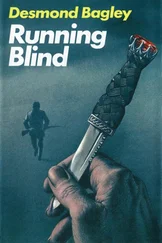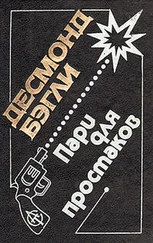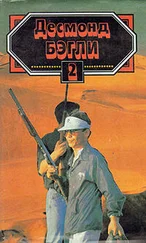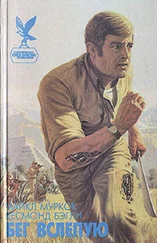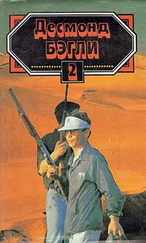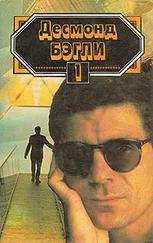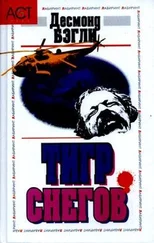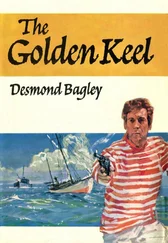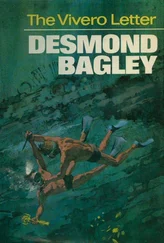Willis had been too optimistic, because two hours went by and the trebuchet was still in pieces and far from being in working order. He wiped a grimy hand across his face. ‘It’s not so bad now — another hour will see it right.’
But they did not get another hour. Benedetta called out, ‘I can hear trucks.’ Following immediately upon her words came the rattle of rifle shots from downriver and another sound that chilled O’Hara — the unmistakable rat-a-tat of a machine-gun. He ran over to Benedetta and said breathlessly, ‘Can you see anything?’
‘No,’ she answered; then, ‘Wait — yes, three trucks — big ones.’
‘Come down,’ said O’Hara. ‘I want to see this.’
She climbed down from among the rocks and he took her place. Coming up the road at a fast clip and trailing a cloud of dust was a big American truck and behind it another, and another. The first one was full of men, at least twenty of them, all armed with rifles. There was something odd about it that O’Hara could not at first place, then he saw the deep skirting of steel plate below the truck body which covered the petrol tank. The enemy was taking precautions.
The truck pulled to a halt by the bridge and the men piled out, being careful to keep the truck between themselves and the river. The second truck stopped behind; this was empty of men apart from two in the cab, and O’Hara could not see what the covered body contained. The third truck also contained men, though not as many, and O’Hara felt cold as he saw the light machine-gun being unloaded and taken hurriedly to cover.
He turned and said to Benedetta, ‘Give me that bow, and get the others over here.’ But when he turned back there was no target for him; the road and mountainside opposite seemed deserted of life, and the three trucks held no profit for him.
Armstrong and Willis came up and he told them what was happening. Willis said, ‘The machine-gun sounds bad, I know, but what can they do with it that they can’t do with the rifles they’ve got? It doesn’t make us much worse off.’
‘They can use it like a hose-pipe,’ said O’Hara. ‘They can squirt a steam of bullets and systematically hose down the side of the gorge. It’s going to be bloody dangerous using the crossbow from now on.’
‘You say the second truck was empty,’ observed Armstrong thoughtfully.
‘I didn’t say that; I said it had no men. There must be something in there but the top of the body is swathed in canvas and I couldn’t see.’ He smiled sourly. ‘They’ve probably got a demountable mountain howitzer or a mortar in there — and if they have anything like that we’ve had our chips.’
Armstrong absently knocked his pipe against a rock, forgetting it was empty. ‘The thing to do now is have a parley,’ he said unexpectedly. ‘There never was a siege I studied where there wasn’t a parley somewhere along the line.’
‘For God’s sake, talk sense,’ said O’Hara. ‘You can only parley when you’ve got something to offer. These boys are on top and they know it; why should they parley? Come to that — why should we? We know they’ll offer us the earth, and we know damned well they’ll not keep their promises — so what’s the use?’
‘We have something to offer,’ said Armstrong calmly. ‘We have Aguillar — they want him, so we’ll offer him.’ He held up his hands to silence the others’ protests. ‘We know what they’ll offer us — our lives, and we know what their promises are worth, but that doesn’t matter. Oh, we don’t give them Aguillar, but with a bit of luck we can stretch the parley out into a few hours, and who knows what a few hours may mean later on?’
O’Hara thought about it. ‘What do you think, Willis?’
Willis shrugged. ‘We don’t stand to lose anything,’ he said, ‘and we stand to gain time. Everything we’ve done so far has been to gain time.’
‘We could get the trebuchet into working order again,’ mused O’Hara. ‘That alone would be worth it. All right, let’s try it out.’
‘Just a minute,’ said Armstrong. ‘Is anything happening across there yet?’
O’Hara looked across the gorge; everything was still and quiet. ‘Nothing.’
‘I think we’d better wait until they start to do something,’ counselled Armstrong. ‘It’s my guess that the new arrivals and the old guard are in conference; they may take a while and there’s no point in breaking it up. Any time we gain is to our advantage, so let’s wait awhile.’
Benedetta, who was standing by quietly, now spoke. ‘Jenny hasn’t come back yet.’
O’Hara whirled. ‘Hasn’t she?’
Willis said, ‘Perhaps she’ll have been hit; that machinegun...’ His voice tailed away.
‘I’ll go and see,’ said Benedetta.
‘No,’ said O’Hara sharply. ‘I’ll go — she may need to be carried and you can’t do that. You’d better stay here on watch and the others can get on with repairing the trebuchet.’
He plunged away and ran across the level ground, skirting the bridgehead where there was no cover and began to clamber among the rocks on the other side, making his way downriver. He had a fair idea of the place Miss Ponsky would have taken and he made straight for it. As he went he swore and cursed under his breath; if she had been killed he would never forgive himself.
It took him over twenty minutes to make the journey — good time considering the ground was rough — but when he arrived at the most likely spot she was not there. But there were three bolts stuck point first in the ground and a small pool of sticky blood staining the rock.
He bent down and saw another blood-spot and then another. He followed this bloody spoor and back-tracked a hundred yards before he heard a weak groan and saw Miss Ponsky lying in the shadow of a boulder, her hand clutching her left shoulder. He dropped to his knee beside her and lifted her head. ‘Where were you hit, Jenny? In the shoulder?’
Her eyes flickered open and she nodded weakly.
‘Anywhere else?’
She shook her head and whispered, ‘Oh, Tim, I’m sorry. I lost the bow.’
‘Never mind that,’ he said, and ripped the blouse from her shoulder, careful not to jerk her. He sighed in relief; the wound was not too bad, being through the flesh part of the shoulder and not having broken the bone so far as he could judge. But she had lost a lot of blood and that had weakened her, as had the physical shock.
She said in a stronger voice, ‘But I shouldn’t have lost it — I should have held on tight. It fell into the river, Tim; I’m so sorry.’
‘Damn the bow,’ he said. ‘You’re more important.’ He plugged the wound on both sides with pieces torn from his shirt, and made a rough bandage. ‘Can you walk?’
She tried to walk and could not, so he said cheerfully, ‘Then I’ll have to carry you — fireman’s lift. Up you come.’ He slung her over his shoulder and slowly made his way back to the bridge. By the time he got to the shelter and delivered her to Benedetta she was unconscious again.
‘All the more need for a parley,’ he said grimly to Armstrong. ‘We must get Jenny on her feet again and capable of making a run for it. Has anything happened across there?’
‘Nothing. But we’ve nearly finished the trebuchet.’
It was not much later that two men began to strip the canvas from the second truck and O’Hara said, ‘Now we give it a go.’ He filled his lungs and shouted in Spanish, ‘Señors — Señors! I wish to speak to your leader. Let him step forward — we will not shoot.’
The two men stopped dead and looked at each other. Then they stared across the gorge, undecided. O’Hara said, in a sardonic aside to Armstrong, ‘Not that we’ve got much to shoot with.’
Читать дальше
Конец ознакомительного отрывка
Купить книгу
